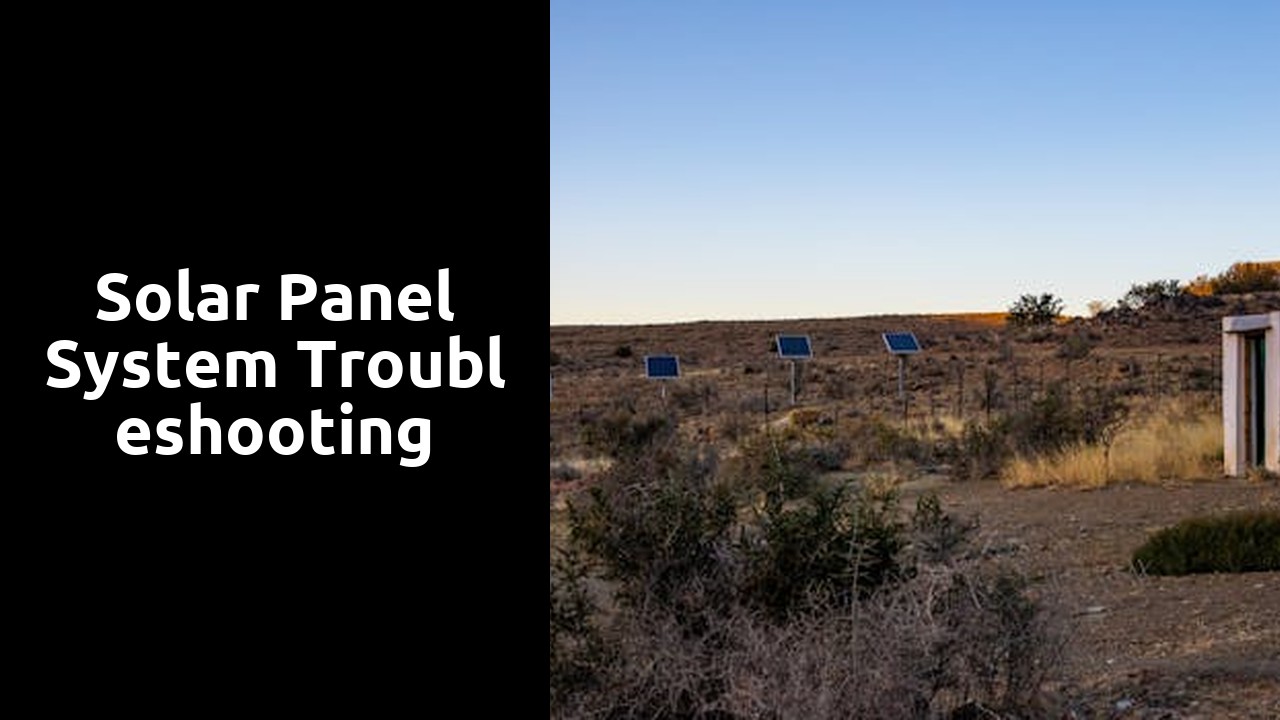
Solar Panel System Troubleshooting
At Solar Scape Energy, our team of experts specialises in providing top-notch Solar Panel System Troubleshooting services. Whether you are experiencing issues with your solar panels not producing enough electricity or any other problems related to your solar energy system, we have the knowledge and skills to diagnose and resolve the issue promptly. Our technicians are dedicated to ensuring that your solar panels are running efficiently, saving you money on your electricity bills and reducing your carbon footprint. Trust Solar Scape Energy for all of your solar panel troubleshooting needs, and let us help you harness the power of the sun for a brighter, more sustainable future.
Dealing with Shading on Solar Panels
Shading can significantly impact the efficiency of solar panels, reducing the amount of sunlight they can convert into energy. To address shading issues, it is crucial to first identify the source of shade - whether it is from nearby trees, buildings, or other structures casting shadows on the panels. Once the source is determined, strategic solutions can be implemented to mitigate the shading and maximise solar energy absorption.
Installing shading management solutions, such as tilt mounts or sun-tracking systems, can help minimise the impact of shading on solar panels. By adjusting the angle or position of the panels throughout the day to align with the sun's path, these solutions can enhance energy production even in partially shaded areas. Additionally, trimming back branches or removing obstacles that cast shadows on the panels can also be effective in improving solar panel performance.
Installing Shade Management Solutions
One common issue that can affect the performance of solar panels is shading. Shading can greatly reduce the amount of sunlight reaching the panels, resulting in reduced energy production. To address shading, installing shade management solutions is essential. This can involve strategically placing panels to minimize shading from nearby trees, buildings, or other obstructions. Additionally, incorporating technologies such as micro inverters or power optimizers can help mitigate the impact of shading on the overall system.
When installing shade management solutions, it is crucial to conduct a thorough assessment of the site to identify potential sources of shading throughout the day. By understanding the specific patterns of shading, you can make informed decisions on panel placement and shading mitigation strategies. Consulting with solar panel experts or using shading analysis tools can provide valuable insights into how to optimise the positioning of panels for maximum sunlight exposure. By proactively addressing shading issues through effective shade management solutions, you can enhance the efficiency and overall performance of your solar panel system.
Assessing Solar Panel Damage
When assessing solar panel damage, it's essential to conduct a thorough inspection to identify any issues that may be affecting the performance of the system. Start by visually examining the panels for any signs of physical damage such as cracks, chips, or discolouration. These flaws can indicate areas where the panel's efficiency may be compromised, leading to reduced energy production.
In addition to physical damage, also check for any potential electrical issues that could be impacting the functionality of the solar panels. This includes inspecting the wiring and connections for signs of wear or damage, as well as ensuring that the panels are properly grounded. By carefully assessing both the physical condition and electrical components of the solar panel system, you can pinpoint the source of any damage and take the necessary steps to address it effectively.
Identifying Physical Panel Flaws
Identifying physical panel flaws is essential to ensuring optimal performance of your solar panel system. One common issue to look out for is cracks on the surface of the panels, which can occur due to various factors such as extreme weather conditions or improper handling during installation. These cracks may not only affect the efficiency of the panels but also pose a safety risk, making it crucial to address them promptly. Additionally, discolouration or dark spots on the panels could indicate potential cell damage or hotspots, which can lead to decreased energy production. Regular inspection of the panels can help identify these flaws early on and prevent further damage to the system.
Enhancing Solar Panel Efficiency
Enhancing the efficiency of your solar panel system is crucial for maximising its energy output and ultimately reducing your electricity bills. One way to boost efficiency is by upgrading to high-efficiency panels, which can convert more sunlight into electricity compared to traditional panels. These advanced panels utilise cutting-edge technology to harness solar energy more effectively, ensuring you get the most out of your solar investment.
Another effective method to enhance solar panel efficiency is by regularly cleaning and maintaining your panels. Dirt, dust, and debris can accumulate on the surface of the panels over time, reducing their ability to absorb sunlight. By keeping your panels clean and well-maintained, you can ensure that they operate at peak performance levels, producing more energy for your household or business. Regular inspections and cleaning routines are simple yet impactful ways to optimise the efficiency of your solar panel system.
Upgrading to HighEfficiency Panels
When it comes to enhancing the efficiency of your solar panel system, upgrading to high-efficiency panels is a crucial step. By investing in panels with advanced technology and higher conversion rates, you can significantly increase the amount of energy your system generates. These high-efficiency panels are designed to capture more sunlight and convert it into electricity more effectively, allowing you to maximise the output of your system.
When selecting high-efficiency panels, look for features such as PERC (Passivated Emitter Rear Cell) technology, which improves energy conversion by reducing electron recombination. Additionally, consider panels with higher wattage ratings to ensure they can generate more power in limited space. Upgrading to high-efficiency panels not only helps you maximise the energy output of your system but also future-proofs your setup against advancements in solar technology.